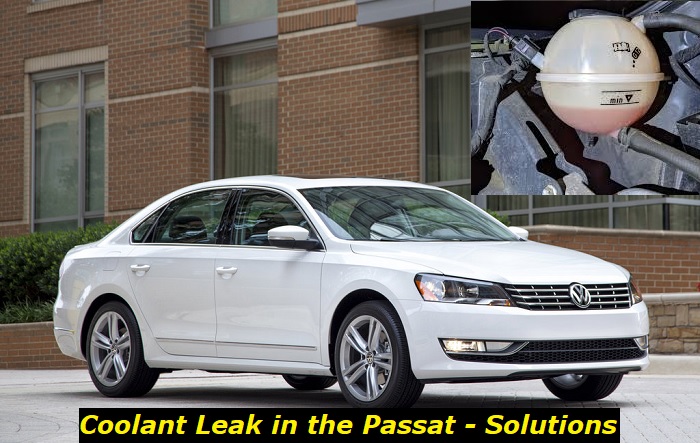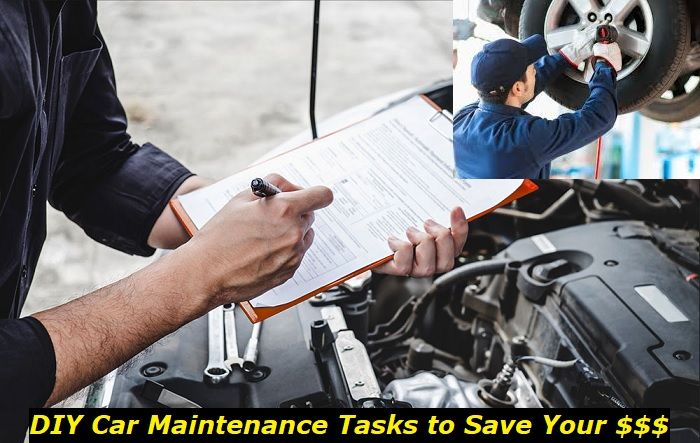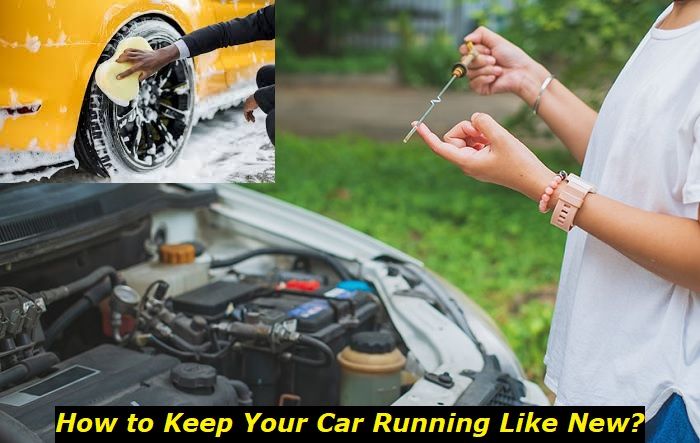Your VW Passat may be leaking coolant in front of the engine because of water pump damage, turbocharger issues, or coolant pipe problems. Sometimes, the leaking will only occur when the RPMs are over 2000, so locating the issue may be extremely hard when the car is lifted in the repair shop.
Coolant leaks highlights
- Level of urgency:very high
- Commonreasons:cooling equipment failure, pipe connections, radiator damage
- DIY diagnostics:possible but complicated
- DIY repair:mostly impossible
- Price of repair:$350 - $1,500
- Time for repair:3 - 8 hours
- If ignored:overheating, equipment failure

Locating the coolant leak in your VW Passat
So, what will tell you about the coolant leak? It's extremely important to spot the leak once it starts because driving with no coolant in your tank is extremely dangerous for the engine. It will overheat and eventually die if the problem is not spotted on time.
There are several obvious things that happen with a car when it has a coolant leak:
- you may see puddles of coolant on the floor of your garage or at the parking place where your car was parked;
- when checking the coolant tank under the hood, you may see that the level of antifreeze is very low or there is just no antifreeze in the tank;
- you may notice that the engine overheats when you drive it, the scale of this problem depends on the amount of coolant left in the system.
One of the first things you want to check when you suspect the coolant leak is if the coolant actually leaking outside. It's not uncommon for older high-mileage engines to have internal leaks because of head gasket problems or cracked engine blocks or heads. Also, the turbocharger and the EGR cooler may leak antifreeze inside and then the engine will burn it. These kinds of leaks are more complicated to repair.
External leaks are easier to locate and repair. You will need to find a certain spot in the engine that leaks. In Volkswagen Passat vehicles it's very often the front part of the engine. Forums are full of threads discussing the reasons for such leaks but it will take you days of time to read through all of them, so let's take just the most important and precious parts of that information.
What are the most common reasons for coolant leaks in front of the engine?
The front part of the engine contains several things that may leak. Also, you should know that sometimes it only seems that the leak occurs in the front part. Very often, the engine is leaking coolant somewhere else but the puddle is formed under the front part of the engine. For example, it can be the radiator or one of the hoses and then the leaked antifreeze flows along the parts of the engine and drops from the engine oil pan making you think the coolant comes out of the engine.
So, here are the most common reasons for leaks in a VW Passat:
1) Turbocharger in the TDI engine
The 2-liter TDI or any other diesel engine in Volkswagen has a turbocharger that also has an intercooler. It's not uncommon for these intercoolers to leak some antifreeze. The leak is not that huge but still, it should be reckoned with.
Such leaks are hard to locate because not a lot of coolant comes out. It means you will not notice an immediate decline in the antifreeze level in your engine. But after some time you will open the hood just to find the empty coolant tank.
Locating and solving this problem on your own is close to impossible. You will need professional help.
2) Crack pipe in 2.8L engine
The V6 engine in older VW Passat vehicles had a problem with the plastic crack pipe. This is the water distribution pipe that runs from the water pump to the thermostat. It's quite funny that it's made of plastic and, in these engines, this is the first thing to check whenever you see any decline in the level of coolant.
There is an option to buy the metal water distribution pipe and forget about this problem for many years.
3) Water pump
This is a pretty common thing to check if the coolant leaks from the front part of the engine. Your water pump in the majority of VW engines is not eternal. It should last about 70-100 thousand miles and then it may fail. It may be driven by a chain or a belt - these ones should be replaced along with the pump.
When the pump leaks, the coolant will go out in the place where the transmission is attached to the engine. Both the engine oil pan and the transmission oil pan will most likely be wet. Also, the coolant may go out on the other side of the engine - where the timing cover is located.
4) Any other coolant pipe or radiator
You may need to check all the pipes that have coolant in them. Those are pipes that connect the radiator, thermostat, and the engine. You should also check the radiator itself because it may leak due to reasons like physical damage.
Remember that when the engine is off or just idling, the leak may not be visible at all. Sometimes, the leak will only open when the engine revs higher than 2000 RPM. It's because of coolant pressure. The pump rotates faster and creates higher coolant pressure. It means that locating such a leak will obviously be a pain in your neck, not to say worse.
5) Thermostat
In different VW engines, the thermostat is placed in different locations. But, in most cases, if it leaks coolant, it will leak in the front part of the engine. In older machines, it's quite easy to locate this problem and to repair the thermostat (I mean replace it of course). But in some fresh engines, VW engineers made some "improvements" and now it's only possible to do that in the dealership or a good repair shop.
Thermostats leak commonly after they have over 100K miles on them. But they may also leak if the coolant is of bad quality or the vehicle is very often overheated.
What are the DIY methods to locate the issue?
First of all, you need to understand the location of the leak. In many cases, this will tell you quite directly about the initial problem. Use a sheet of paper to find the actual location of the issue. Also, you may want to press a gas pedal and rev up the engine to make the coolant leak more.
Make sure you do this when the coolant level is OK, otherwise, your car may overheat and cause additional problems.
Also, you can replace some pipes and hoses if you eventually locate the leak. It's not that hard in many engines. But when it comes to a more serious repair, I wouldn't recommend you do this on your own. Volkswagen engines are pretty complicated and you may easily make things worse.
What if you keep driving with the coolant leak?
It's not really acceptable to drive with a serious coolant leak. If you do that, your vehicle may fail. Overheating happens very quickly and you may not have the time to look at the coolant temperature gauge. You will notice problems when the car throws an error message or just stalls. Sometimes, it's too late.
The leaks are not only dangerous because of potential overheating. The coolant may leak on something important under the hood of your car like some sensor, electrical connection, or maybe electronic control unit. It's not uncommon for the coolant to leak onto the starter and alternator in Volkswagen cars. In these cases, you may not only lose coolant and overheat the engine but also need to buy a new starter motor.
How can you add coolant to your VW if you don't have it?
Only some of us will have several liters of coolant in our trunks. It's a good habit to have it just in case something happens, but you will develop that habit only after you get into trouble once.
So, here's what you can do if there is no coolant available but you need to add something to the tank:
- the best option is to ask someone to give you a ride to the nearest place where you can buy the proper coolant;
- if this is impossible, try to buy clean water that's prepared for use in the cooling system (at gas stations or car part stores);
- if this is also impossible, try to find clean bottled water - it's still better than nothing;
- if this is not available, just call a tow truck, don't experiment with other liquids.
If you take dirty water from a puddle on the roadside, you will most likely need to clean and even change several parts of the cooling system. This may cost you much more than what a tow truck costs.
It's important to make sure that the engine in your Volkswagen is properly cooled. Also, any coolant leak should not be ignored.
About the authors
The CarAraC research team is composed of seasoned auto mechanics and automotive industry professionals, including individuals with advanced degrees and certifications in their field. Our team members boast prestigious credentials, reflecting their extensive knowledge and skills. These qualifications include: IMI: Institute of the Motor Industry, ASE-Certified Master Automobile Technicians; Coventry University, Graduate of MA in Automotive Journalism; Politecnico di Torino, Italy, MS Automotive Engineering; Ss. Cyril and Methodius University in Skopje, Mechanical University in Skopje; TOC Automotive College; DHA Suffa University, Department of Mechanical Engineering






Add comment